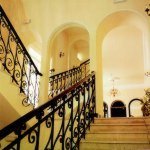 The basic work of the Sejm is performed in parliamentary committees, led
by a chairman and his deputies, who constitute the committee presidium,
chosen in open election by a majority vote from among committee members
at the first sitting of the new term. The committees debate during
sittings is summoned by the chairman. The chairman or one of his deputies
preside over the debates. The chairman of the debates is entitled to
privileges which introduce discipline into the discussion: after calling a Deputy twice to keep to the point under discussion, he is empowered to direct the speaker to discontinue the speech which deviates from the topic of the committee's debates.
The basic work of the Sejm is performed in parliamentary committees, led
by a chairman and his deputies, who constitute the committee presidium,
chosen in open election by a majority vote from among committee members
at the first sitting of the new term. The committees debate during
sittings is summoned by the chairman. The chairman or one of his deputies
preside over the debates. The chairman of the debates is entitled to
privileges which introduce discipline into the discussion: after calling a Deputy twice to keep to the point under discussion, he is empowered to direct the speaker to discontinue the speech which deviates from the topic of the committee's debates.
The committee sittings are attended on an obligatory basis by ministers
and heads of supreme organs of State administration (or their
representatives), whose range of activity is enclosed within the issues
considered at the given meeting. The presidium of the committee or its
chairman may invite also other persons to participate in the sittings,
i.e. representatives of professional and social organisations and
experts.
 The right to take part in committee sittings is enjoyed also by those
Deputies who are members of other committees. They may participate in
the discussion and submit motions, but cannot vote. The chairman of the
committee may consent to the presence of press, radio and television
journalists. Owing to the topic of the debates, or for other reasons,
the committee may decide that its sitting will be closed; in such cases,
the committee itself designates persons whose presence at the closed
sitting is indispensable.
The right to take part in committee sittings is enjoyed also by those
Deputies who are members of other committees. They may participate in
the discussion and submit motions, but cannot vote. The chairman of the
committee may consent to the presence of press, radio and television
journalists. Owing to the topic of the debates, or for other reasons,
the committee may decide that its sitting will be closed; in such cases,
the committee itself designates persons whose presence at the closed
sitting is indispensable.
Committee resolutions are passed by a majority vote in the presence of
at least one-third of the statutory number of members of the committee.
The committees may hold joint sittings presided by one of the committee
chairmen. The resolutions are then passed by a majority vote, in the
required presence of at least one-third of the statutory number of the
members of each committee. If equal votes are obtained concerning a procedural issue, then
the acceptance or rejection of the bill is decided by the vote of the
chairman (unless he abstained). A committee may establish from its midst ad
hoc subcommittees, at the same time determining their composition and
range of activity, and, with the consent of the Presidium of the Sejm,
permanent subcommittees.
The sittings of the committees (subcommittees) are noted down in
minutes. Apart from the minutes, which comprise an official record of
the course of the debates and the passed resolutions, the committees
prepare a bulletin intended predominantly for the press, radio and
television. Such a bulletin is an unofficial summary of the committee
debates.